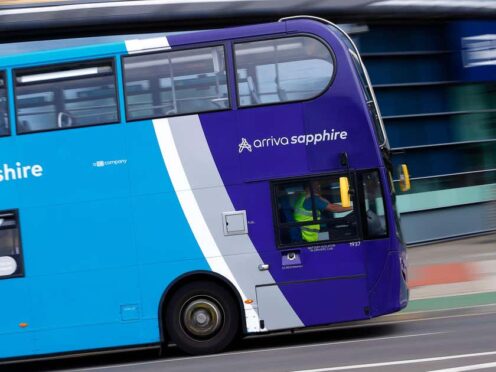Arriva in West Yorkshire has been ranked England’s worst bus operator.
Just 66% of passengers were satisfied with their last journey, a survey by watchdog Transport Focus covering 55 operators indicated.
Yorkshire towns and cities served by Arriva buses include Leeds and Wakefield.
Arriva, based in Sunderland, is one of the UK’s largest train and bus operators.
It is a subsidiary of Germany’s state-owned transport giant Deutsche Bahn but a takeover by US-based infrastructure investor I Squared Capital understood to be worth around 1.6 billion euro (£1.4 billion) was agreed in October last year.
The Transport Focus research showed that passengers travelling in urban metropolitan areas across England are less satisfied (78%) on average compared with those making journeys elsewhere.
The watchdog said: “This is not surprising as urban metropolitan services are the most likely to be affected by crowding, and are most likely to encounter traffic and roadworks, making services run late.
“Crowding makes people less satisfied, even when they can get a seat.
“Passengers who sat next to someone they didn’t know are significantly less satisfied than those who didn’t.”
The top-ranked operator was Stagecoach in Portsmouth, which had a passenger satisfaction score of 91%.
Transport Focus found that overall, 80% of bus passengers in England were satisfied with their last journey, with 8% dissatisfied.
It said bus drivers can “make or break a journey”, with passengers noting if they wait until someone is seated before moving off, and how careful they drive.
The research, which was conducted for the first time, gathered feedback on more than 35,000 journeys in England.
Transport Focus director David Sidebottom said: “It is good to see many passengers are satisfied with their journey.
“Eighty per cent overall satisfaction is a good start.
“However, wide variation in scores show that some passengers are being let down.
“As congestion continues to bite, Government, bus operators and local authorities must work together so that passengers see the improvements in reliability, journey times and better value for money fares promised in the national bus strategy.
“We’ll be using the results from this survey as a benchmark for local transport authorities and bus operators to drive improvements and attract more people onto buses.”
Graham Vidler, chief executive for industry body the Confederation of Passenger Transport (CPT), said: “It’s great to see eight out of 10 passengers were satisfied with their last bus journey, and even better to see satisfaction as high as 90% in some areas such as Bournemouth, Christchurch and Poole or the East Riding of Yorkshire.
“To drive improvements for bus passengers right across the country, operators and local authorities will want to learn from these high-performing places.
“These results also highlight the persistent challenge posed by road congestion when it comes to delivering reliable, punctual bus services, especially in peak periods.
“This is why it’s vital local authorities invest in measures to give buses priority on key routes, and it’s why CPT is calling on the next government to require all local authorities to improve bus speeds by 10% over the next five years.
“Given that bus drivers are the most thanked profession in the country, it’s also gratifying for bus operators to learn that this survey also found 85% of passengers were satisfied with their bus driver.”
Kim Cain, area director for Arriva North East and Yorkshire, said: “It is clear that we have not been performing as well as we’d want to, and there have been some challenges in us being able to deliver the best service that we can for people in Yorkshire.
“But we’re doing our best to try and put that right and we’re keen to work with Transport Focus in our planning.
“One of the challenges in Yorkshire has been a shortage of bus drivers, but that is changing as Arriva has a large number of trainees completing their courses.”
